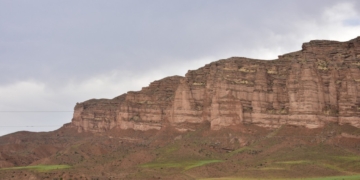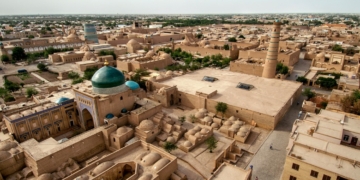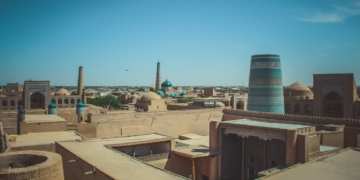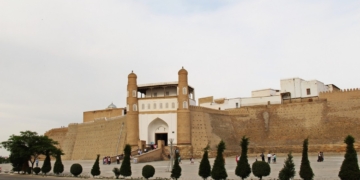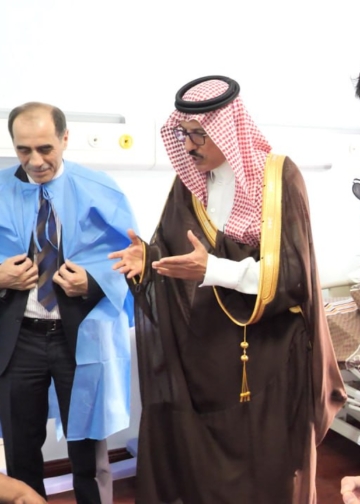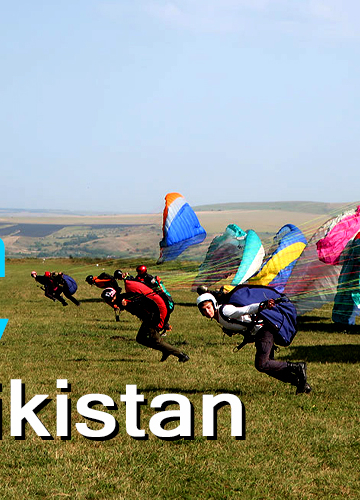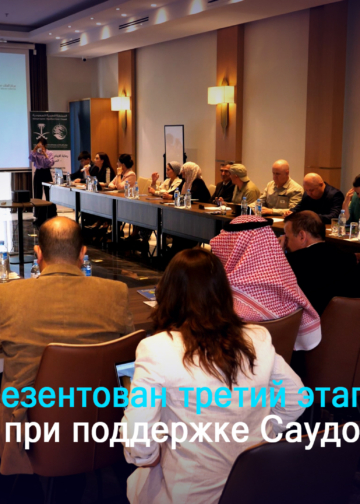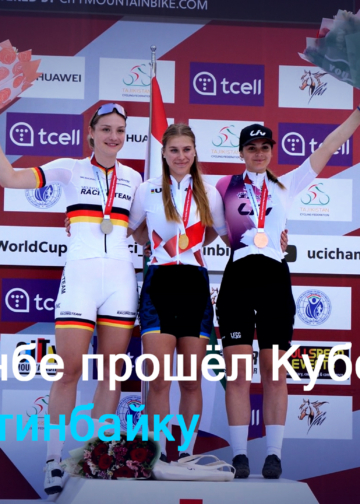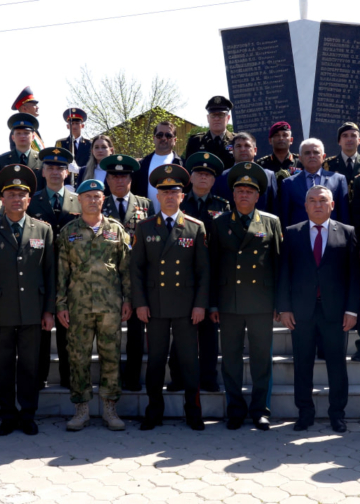id: 672
date: 8/8/1994 3:22
refid: 94DUSHANBE2006
origin: Embassy
Dushanbe
classification:
CONFIDENTIAL
destination:
94DUSHANBE2003|94MOSCOW22287
header:
O 080322Z AUG 94
FM AMEMBASSY DUSHANBE
TO SECSTATE WASHDC
IMMEDIATE 4134
INFO AMEMBASSY MOSCOW
IMMEDIATE
USMISSION USUN NEW
YORK IMMEDIATE
USMISSION USVIENNA
IMMEDIATE
AMEMBASSY TASHKENT
IMMEDIATE
AMEMBASSY WARSAW
IMMEDIATE
AMEMBASSY BISHKEK IMMEDIATE
AMEMBASSY ALMATY
IMMEDIATE
AMEMBASSY ASHGABAT
IMMEDIATE
AMEMBASSY ISLAMABAD
IMMEDIATE
AMCONSUL PESHAWAR
IMMEDIATE
AMEMBASSY NEW DELHI
IMMEDIATE
CIA WASHDC IMMEDIATE
1075
DIA WASHDC IMMEDIATE
1079
——————
header ends —————-
C O N F I D E N T I A
L SECTION 01 OF 02 DUSHANBE 02006
DEPARTMENT PLEASE
PASS EUR/ISCA;
USMISSION USVIENNA
FOR USDEL CSCE;
MOSCOW FOR POL
(PLEASE PASS AMBASSADOR ESCUDERO)
WARSAW FOR JACK
ZETKULIK
E.O. 12356: DECL:
OADR
TAGS: GOV, PREL,
PINR, PHUM, TI, RS
SUBJECT: FORMER PRIME
MINISTER ABDULLAJANOV NOMINATED FOR
PRESIDENT IN WHAT IS
SHAPING UP AS A REAL HORSERACE
REF: A) MOSCOW 22287, B) DUSHANBE 2003,
1. CONFIDENTIAL — ENTIRE TEXT.
2. SUMMARY:
THE LENINABAD REGION HAS OVERWHELMINGLY NOMINATED
FORMER PRIME MINISTER
ABDULLAJANOV FOR PRESIDENT. HE JOINS
PARLIAMENT CHAIRMAN
RAHMONOV IN THE RACE WHICH WILL BE DECIDED IN
THE SEPTEMBER 25
ELECTION. ABDULLAJANOV, WHO SERVED BOTH
THE
OPPOSITION AND THE
RAHMONOV GOVERNMENTS AS PRIME MINISTER,
EMERGES AS A VERY
STRONG CANDIDATE, POSSIBLY THE INITIAL
FAVORITE. OPPOSITIONISTS’ PUBLIC CONCERNS/THREATS
REGARDING THE
CONSEQUENCES OF A
ONE-MAN RACE APPEAR MOLLIFIED. WE SEE
ABDULAJANOV LIKELY TO
CAPITALIZE ON BROAD DISSATISFACTION WITH
THE CURRENT
GOVERNMENT WHICH HAS BEEN UNABLE TO STOP THE SLIDE
INTO ECONOMIC CHAOS
AND IS WIDELY RESENTED FOR ITS CORRUPTION AND
HEAVY HANDEDNESS.
PUBLIC CHARGES OF CORRUPTION AGAINST
ABDULAJANOV WILL
UNDERMINE HIS CAMPAIGN AS WELL, HOWEVER.
THIS
IS A HIGH STAKES RACE
IN WHICH BOTH SIDES ARE LIKELY TO PULL OUT
ALL STOPS. INTERNATIONAL MONITORING COULD BE DECISIVE IN
DETERMINING WHETHER
TAJIKISTAN’S VOTERS HAVE A CHANCE TO CAST
THEIR VOTES IN A FREE
AND FAIR ELECTION. END SUMMARY
3. THE LENINABAD REGIONAL ASSEMBLY MEETING IN
SPECIAL SESSION
AUGUST 6 NOMINATED
ABDULMALIK ABDULAJANOV, FORMER PRIME MINISTER
AND CURRENTLY
TAJIKISTAN’S AMBASSADOR IN MOSCOW, AS THE REGION’S
PRESIDENTIAL
NOMINEE. HE JOINS CHAIRMAN OF THE
NATIONAL ASSEMBLY
(AND CURRENTLY CHIEF
OF STATE) EMOMALI RAHMONOV IN THE RACE FOR
PRESIDENT TO BE
DECIDED IN NATIONAL ELECTIONS SEPTEMBER 25 (REFS
A AND B).
4. THE KEENLY WATCHED LENINABAD SESSION PRODUCED
THREE
CANDIDATES FOR THE
REGIONAL NOMINATION: ABDULAJANOV, RAHMONOV AND
A PROMINENT UZBEK
BUSINESSMAN FROM KANIBODAM DISTRICT (YUSUFJON
AHMADOV). AHMADOV
IMMEDIATELY WITHDREW HIS NAME FROM
CONSIDERATION SETTING
UP A HEAD-TO-HEAD CONFRONTATION BETWEEN
RAHMONOV AND
ABDULLAJANOV. IN A SECRET BALLOT,
ABDULAJANOV WAS
THE EASY WINNER
COLLECTING 137 VOTES TO RAHMONOV’S 33. GOTI
CENTRAL MEDIA
REPORTED THE LENINABAD ASSEMBLY RESULT ONE DAY
AFTER THE ACTION BUT
OMITED THE FACT THAT THERE HAD BEEN A HEAD
TO HEAD CONTEST
BETWEEN ABDULLAJANOV AND RAHMONOV AND THAT THE
ABDULLAJANOV HAD BEEN
AS DECISIVE AS IT WAS.
5. THE LENINABAD ACTION CAME IN THE WAKE OF THE
NOMINATION OF
RAHMONOV BY THE
KHATLON REGIONAL ASSEMBLY AND BY THE NATIONAL
YOUTH FEDERATION (REF
B). BOTH BODIES HAD SENT FORMAL MESSAGES
TO THE LENINABAD
REGIONAL SESSION URGING THAT IT JOIN IN A
CONSENSUS ENDORSEMENT
OF RAHMONOV.
6. WHILE THERE HAS BEEN NO OPPOSITION REACTION
TO ABDULAJANOV’S
NOMINATION,
STATEMENTS ON THE EVE OF THE LENINABAD NOMINATION HAD
INCLUDED WARNINGS
ABOUT THE CONSEQUENCES OF A ONE-MAN RACE FOR
PRESIDENT. LEADER OF TAJIKISTAN’S REFUGEE ORGANIZATION
IN MOSCOW
AND OPPOSITIONIST
HABIB SANGINOV WAS QUOTED ON RADIO KHORASAN
(IRAN) AS HAVING
STATED THAT IF RAHMONOV EMERGED AS THE ONLY
CANDIDATE, THE
SEPTEMBER 25 VOTE COULD NOT BE CONSIDERED TO BE A
REAL ELECTION. OPPOSITION COMMANDER REDZUAN IN THE SAME
BROADCAST WAS QUOTED
AS STATING THAT IF RAHMONOV WERE THE ONLY
NOMINEE THEN THE
OPPOSITION WOULD CAST ITS VOTE WITH ROCKETS.
THERE WILL BE MUCH
ATTENTION PAID TO THE FORMAL AND INFORMAL
OPPOSITION REACTION
TO THE NOMINATION OF ABDULAJANOV, WHO WAS
PRIME MINISTER IN THE
BRIEF OPPOSITION GOVERNMENT (SEPTEMBER-
NOVEMBER 1992) AS
WELL AS PRIME MINISTER UNDER RAHMONOV (NOVEMBER
1992 — DECEMBER
1993). (ABDULAJANOV WAS ALSO MINISTER OF
BREAD
AND BRIEFLY PRIME
MINISTER UNDER TAJIKISTAN’S FIRST ELECTED
PRESIDENT, RAHMON
NABIYEV.)
7. STILL TO COME ARE POSSIBLE NOMINATIONS BY THE
GORNO
BADAKHSHAN AUTONOMOUS
REGIONAL ASSEMBLY AS WELL AS POSSIBLE
ACTION BY DUSHANBE
AND OTHER DISTRICTS IN THE HISSAR AND GARM
VALLEYS. THE COMMUNIST PARTY AND THE NEW POLITICAL
PARTY, «THE
PARTY FOR POLITICAL
AND ECONOMIC RENEWAL,» AS WELL AS THE
NATIONAL LABOR
FEDERATION MAY NOMINATE OTHER CANDIDATES ALTHOUGH
AT THIS POINT THAT
APPEARS UNLIKELY. RATHER, IF THEY NINATE
ANYONE AT ALL, THEY
WOULD LIKELY LINE UP BEHIND ABDULAJANOV OR
RAHMONOV. THE LABOR
FEDERATION, DOMINATED BY KULYABIS, WILL
ALMOST CERTAINLY BACK
RAHMONOV.
8. COMMENT/ANALYSIS: WITH ABDULAJANOV IN THE CONTEST, THE
PRESIDENTIAL ELECTION
AUTOMATICALLY BECOMES A REAL HORSE RACE.
WE ESTIMATE THAT
ABDULAJANOV CAN COUNT ON STRONG SUPPORT IN HIS
HOME REGION OF
LENINABAD, AND AMONG TAJIKISTAN’S UZBEK COMMUNITY
WHICH MAKES UP
APPROXIMATELY 24 PERCENT OF THE POPULATION.
OTHER
MINORITIES WILL
LIKELY ALSO BACK ABDULAJANOV. THE FORMER
OPPOSITION HOMELANDS
IN THE GARM VALLEY, GORNO BADAKHSHAN AND THE
GARM AND PAMIRI
COMMUNITIES IN FORMER KURGAN TYUBE REGION WOULD
ALMOST CERTAINLY
PREFER ABDULAJANOV TO RAHMONOV — IF THEY CHOOSE
TO PARTICIPATE IN THE
ELECTION. THIS WOULD APPEAR TO LEAVE
ONLY
THE LESS THAN UNITED
KULYAB CLAN AS CLEARLY IN RAHMONOV’S COLUMN.
MOREOVER, THE RAPID
SLIDE INTO ECONOMIC CHAOS ENTAILING UNPAID
SALARIES AND PENSIONS
AND CURRENCY SHORTAGES WILL INEVITABLY CUT
DEEPLY INTO ANY
PRO-RAHMONOV VOTE. ON THE FACE OF IT, IT
WOULD
APPEAR THAT
ABDULAJANOV EMERGES AS THE EARLY FAVORITE IN THE
RACE.
9. SEVERAL ADDITIONAL CONSIDERATIONS MAY
INTRUDE, HOWEVER.
THE CIVIL WAR OF 1992
BEGAN AS A NORTH-SOUTH CONFRONTATION
BETWEEN THE
GARM/PAMIRI REGIONS AND THE NORTHERN (LENINABAD)
REGION. THE LENINABAD
POLITICAL LEADERSHIP DREW THE KULYABIS INTO
THE STRUGGLE
TRANSFORMING IT INTO A SOUTH-SOUTH CONFLICT WITH
LENINABAD ON THE
SIDELINES. RECENTLY, GROWING ANIMOSITY
BETWEEN
KULYABIS AND UZBEKS
HAD SEEMED TO BE PROVIDING THE BASIS FOR A
RAPPROCHEMENT BETWEEN
KULYABIS AND GARMIS, NOTABLY IN THE FORMER
KURGAN TYUBE REGION
AS POST HAS REPORTED (SEE DUSHANBE 1563).
HOWEVER, RECENT VERY
HEAVY FIGHTING IN TAVILDARA DISTRICT HAS LED
TO NEW TENSIONS
BETWEEN GARMIS AND KULYABIS (SEPTEL).
10. PERHAPS MOST IMPORTANTLY, THE HIGH STAKES
INVOLVED IN THIS
RACE, MAKE IT LIKELY
THAT BOTH SIDES WILL BE PREPARED TO USE
WHATEVER MEANS ARE
NECESSARY TO SECURE VICTORY. PHYSICAL
INTIMIDATION (OR
WORSE) TARGETING CANDIDATES, CAMPAIGN WORKERS
AND VOTERS CAN NOT BE
RULED OUT. RAHMONNOV’S ABILITY TO
CONTROL
THE MEDIA FOR HIS
PURPOSES IS LIKELY TO BE EXPLOITED.
ALREADY
HEROIC DESCRIPTIONS
OF RAHMONOV AND SCANDAL MONGERING ATTACKS ON
ABDULAJANOV HAVE
APPEARED IN THE GOTI CONTROLLED MEDIA.
THE
PUBLISHER OF THE
PRO-ABDULAJANOV WEEKLY «TOJIKISTON»
HAS TOLD HIS EDITOR
THAT FOR TWO MONTHS THE PAPER WILL NOT
PUBLISH. HE EXPLAINED THAT IF THE PAPER TAKES A
PRO-ABDULAJANOV
POSTURE THE STAFF
WILL BE AT RISK. HOWEVER, THE PAPER WILL
NOT
SUBMIT TO PRESSURE TO
BECOME A RAHMONOV MOUTHPIECE.
11. FINALLY, THE ROLE OF FOREIGN INTERESTS IS AS
YET AN UNKNOWN.
A LENGTHY PAEAN TO
RAHMONOV BY RUSSIAN AMBASSADOR SINKEVICH ON
NATIONAL TELEVISION
AUGUST 7 PRESUMABLY DOES NOT SIGNAL A PRO-
RAHMONOV TILT BY THE
RUSSIANS — WHOM WE EXPECT TO BE EITHER
QUIETLY
PRO-ABDULAJANOV OR NEUTRAL. BOTH
UZBEKISTAN AND RUSSIA
HAVE THE ABILITY TO
TURN THE ECONOMIC SCREWS ON TAJIKSITAN — OR
MAKE THINGS EASIER,
TO INFLUENCE VOTES. WE NOTE MOSCOW RADIO
COMMENTARY AUGUST 7
DESCRIBED ABDULLAJANOV AS LIKELY TO GET MOST
OF THE RUSSIAN
MINORITY VOTE AS HE HAD CHAMPIONED BOTH USE OF
RUSSIAN AS AN
OFFICIAL LANGUAGE AND DUAL CITIZENSHIP FOR RUSSIANS
LIVING IN TAJIKISTAN.
12. THE ONLY ASSESSMENT THAT CAN BE MADE WITH
CONFIDENCE AT THIS
POINT IS THAT IT
APPEARS THAT THERE WILL BE A HARD FOUGHT CONTEST
FOR PRESIDENT. INTERNATIONAL MONITORING WILL BE CRITICAL IF
THERE IS TO BE ANY
REALISTIC HOPE THAT THE VOTERS WILL HAVE A
CHANCE OF MAKING A
FREE AND FAIR CHOICE.
MCWILLIAMS
=======================CABLE
ENDS============================
id: 1035
date: 12/21/1999 9:27
refid: 99ALMATY12359
origin: US Office
Almaty
classification:
CONFIDENTIAL
destination:
header:
R 210927Z DEC 99
FM AMEMBASSY ALMATY
TO SECSTATE WASHDC
6195
INFO AMEMBASSY PARIS
AMEMBASSY ISLAMABAD
AMEMBASSY MOSCOW
AMEMBASSY TASHKENT
AMEMBASSY BISHKEK
AMEMBASSY ASHGABAT
AMEMBASSY WARSAW
USMISSION GENEVA
USMISSION USOSCE
VIENNA
USMISSION USUN NEW
YORK
USCINCEUR VAIHINGEN
GE//ECJ2//
USCINCCENT MACDILL
AFB FL//DIA REP/CCJ2-JCH/CCJ5//
JOINT STAFF
WASHDC//J2/J5//
——————
header ends —————-
C O N F I D E N T I A
L SECTION 01 OF 02 ALMATY 012359
FROM EMBASSY DUSHANBE
DEPT FOR S/NIS —
BEYRLE AND WILSON, EUR/CACEN —
BOND AND LEVINE
DEPT ALSO FOR INR/B
E.O. 12958: DECL I2/20/09
TAGS: PGOV, PINR, TI
SUBJECT: TAJIKISTAN:
SCENES FROM A BACK-ROOM
RESHUFFLE
REF: FBIS RESTON VA 200804Z DEC 99
CLASSIFIED BY CHARGE
DOUGLAS B. KENT FOR REASON
1.5 (D).
1. (C) SUMMARY.
PRESIDENT RAHMONOV IS
RESHUFFLINQ HIS
CABINET. A CABINET INSIDER
DESCRIBED TO US HOW
RAHMONOV, TRUE TO CHARACTER,
IS DOING THIS IN A
WAY THAT MAXIMIZES THE
HUMILIATION OF
EVERYONE INVOLVED. HIS CHOICE FOR
PRIME MINISTER, THE
RELATIVELY UNKNOWN AND
UNINFLUENTIAL OQIL
OQILOV, WAS A SURPRISE TO MANY.
SOME SPECULATE THAT
RAHMONOV’S MAIN INTEREST WAS
IN APPOINTINQ SOMEONE
WHO HASN’T MADE TOO MUCH
MONEY WORKINQ IN THE
GOTI. END SUMMARY.
2. (C) GENERAL HABIB SANQINOV, DEPUTY MINISTER
OF
INTERIOR IN THE GOTI,
SUMMONED EMBASSY SENIOR FSN
DECEMBER 14 TO
DISCUSS HIS VIEWS OF PRESIDENT
RAHMONOV’S PLANS FOR
RESHUFFLINQ HIS CABINET —
PLANS THAT LED TO THE
DECEMBER 20 APPOINTMENT OF
OQIL OQILOV AS THE
NEW PRIME MINISTER (REFTEL).
3. (C) SANQINOV DESCRIBED A MEETINQ RAHMONOV HAD
CALLED OF HIS SENIOR
DEPUTIES ON OECEMBER 12.
STARTINQ WITH
THEN-PRIME MINISTER YAHYO AZIMOV,
RAHMONOV BEQAN TO
DISCUSS THE RESHUFFLE’S
IMPLICATIONS FOR
THEM. PHYSICALLY CARESSINQ
AZIMOV TO MAXIMIZE
THE MAN’S HUMILIATION, RAHMONOV
TOLD AZIMOV HE WOULD
NOT BE LEFT WITHOUT A
POSITION IN THE NEW
GOVERNMENT (COMMENT: WHAT
THAT WOULD BE,
RAHMONOV DID NOT SAY, BUT IT MUST
HAVE BEEN CLEAR TO
EVERYONE PRESENT THAT THE PRIME
MINISTER’S JOB WAS
NOT WHAT RAHMONOV HAD IN MIND).
4. (C) RAHMONOV THEN ADDRESSED, ONE BY ONE, HIS
DEPUTY PRIME
MINISTERS, MINISTERS, AND COMMITTEE
CHAIRMEN. RAHMONOV ENCOURAQED SOME, LIKE DEPUTY
PRIME MINISTER
ABDURAHMON AZIMOV, TO RUN IN
PARLIAMENTARY
ELECTIONS NEXT YEAR. HE TOLD
OTHERS, LIKE BASQUL
DODIKHUDOEVA, THAT HE WOULD
FIND SOME SORT OF
POSITION IN THE NEXT QOVERNMENT
FOR THEM, ALTHOUQH HE
AVOIDED PROMISINQ ANYTHINQ
SPECIFIC. HE HAD NO SUQGESTIONS FOR SOME OTHERS,
SUCH AS ISMAT
ESHMIRZOEV — ALL THEY LEARNED WAS
THAT THEY WOULD SOON
BE OUT OF A JOB. OEPUTY
PRIME MINISTERS
TURAJONZADA, VAZIROV, AND RASULOV
— WHO HAVE BEEN IN
OFFICE FOR LESS TIME THAN THE
OTHERS — WILL STAY
ON IN THEIR CURRENT POSITIONS.
5. (C) RAHMONOV TOLD HIS CHIEF OF
ADMINISTRATION,
MAHMADNAZAR SALIHOV,
TO CONSIDER RUNNINQ FOR A
SEAT IN THE NEW
PARLIAMENT. SALIHOV — TRUE TO
HIS NICKNAME,
«MR. STUBBORN» — OBJECTED.
RAHMONOV REBUKED HIM,
RESPONDING THAT «WE WILL
WAIT AND SEE WHETHER
YOU WILL AQREE TO DO SO OR
NOT.» ACCORDINQ TO SANQINOV, THE MEETINQ LEFT THE
FATE OF NATIONAL
SECURITY COUNCIL SECRETARY
AMIRKUL AZIMOV
UNKNOWN (NOTE: AZIMOV SERVES AS
RAHMONOV’S
TROUBLE-SHOOTER, MOST RECENTLY DURINQ
THE CRISIS CAUSED BY
THE ISLAMIC MOVEMENT OF
UZBEKISTAN QUERILLA
FORCE OPERATINQ ON
TAJIKISTAN’S
TERRITORY AND SEIZINQ KYRQYZ AND
JAPANESE HOSTAQES IN
KYRQYZSTAN.)
6. (C) ALSO DISCUSSED AT THE MEETINQ WERE
RAHMONOV’S POLITICAL
OPPONENTS. SANQINOV
DESCRIBED A
VINDICTIVE RAHMONOV RAILINQ AQAINST
HIS PRESIDENTIAL
CAMPAIQN OPPONENT, OAVLAT USMON,
AND HIS WOULD-BE
PRESIDENTIAL CAMPAIQN OPPONENTS,
SULTAN QUVVATOV AND
SEYFIDDIN TURAYEV. RAHMONOV
SAID HE PLANNED TO
«PURSUE» TURAYEV (COMMENT:
PROBABLY THE MOST
POPULAR OF THE THREE) TO THE
POINT WHERE TURAYEV
LEFT THE COUNTRY. (COMMENT:
RAHMONOV NEVER MAKES
PEACE WITH HIS RIVALS —
ABDUMALIK
ABDULLAJANOV, WHO FLED TO UZBEKISTAN, IS
ANOTHER CASE IN
POINT).
NEW PRIME MINISTER’S
BIODATA
—————————
7. (C) OQIL OQILOV (ALTERNATIVE SPELLINQ: AKIL
AKILOV) WAS BORN IN
1944 IN KHOJAND, LENINABAD
REQION (THE NORTHERN
PART OF TAJIKISTAN). AFTER
QRADUATINQ IN
CONSTRUCTION ENQINEERINQ FROM A
MOSCOW INSTITUTE, HE
WORKED AS A KHOJAND CITY
GOVERNMENT
CONSTRUCTION OFFICIAL, EVENTUALLY
BECOMINQ MINISTER OF
CONSTRUCTION IN THE
QOVERNMENT OF THE
THEN-TAJIK S.S.R. HE REMAINED
IN THE QOVERNMENT
THROUQH INDEPENDENCE AND THE
CIVIL WAR. RAHMONOV APPOINTED HIM DEPUTY PRIME
MINISTER IN LATE
1994. HE SERVED IN THIS POSITION
UNTIL RAHMONOV SENT
HIM PACKINQ IN 1997. HE
RETURNED TO KHOJAND,
WHERE HE WAS APPOINTED DEPUTY
CHAIRMAN OF THE
REQIONAL HUKUMAT (GOVERNMENT).
COMMENT
——-
8. (C) OQILOV’S APPOINTMENT COMES AS A SURPRISE
—
— HE IS CONSIDERABLY
LESS WELL-KNOW AND LESS
INFLUENTIAL THAN SOME
OF THE OTHER INDIVIDUALS WHO
WERE APPARENTLY IN THE
RUNNINQ, SUCH AS DUSHANBE
MAYOR AND RAHMONOV
CONFIDANT MAHMADSAID
UBAIDULLOEV. LIKE HIS PREDECESSOR, AZIMOV, HE IS
A NORTHERNER, AND HIS
REGIONAL IDENTITY PROBABLY
PLAYED AN IMPORTANT
ROLE IN HIS SELECTION, WITH
RAHMONOV KEEPINQ HIS
BASE OF SUPPORT BROADER THAN
HIS NATIVE KULYAB
REQION IN THE SOUTH.
9. (C) SOME OBSERVERS SPECULATE THAT OQILOV’S
BEINQ OUT OF POWER,
AND OUT OF THE CAPITAL, FOR AN
EXTENDED PERIOD OF
TIME PLAYED IN HIS FAVOR.
RAHMONOV, THEY SAY,
WANTED TO APPOINT SOMEONE WHO
HAD NOT MADE AS MUCH
MONEY IN QOVERNMENT AS HIS
CURRENT CABINET
MEMBERS. TO ILLUSTRATE THE BANDIT
CULTURE PREVAILINQ IN
THE RAHMONOV REQIME,
SANQINOV TOLD EMBASSY
SENIOR FSN OF A RECENT VISIT
TO DEPUTY PRIME
MINISTER ABDURAHMON AZIMOV’S
OFFICE. AS THEY WERE TALKINQ, A TELEPHONE CALL
FROM PRIME MINISTER
YAHYO AZIMOV CAME THROUQH. IN
FRONT OF SANQINOV,
ABDURAHMON AZIMOV COMPLAINED TO
THE PRIME MINISTER
THAT «YOU HAVE BOUQHT ALMOST
HALF OF KHOJAND AND
HAVE ENOUQH TO LIVE ON. I
HAVE NOT QOT ANYTHINQ
BEHIND ME AND HAVE NO
PROSPECTS FOR THE
FUTURE!»
KENT
=======================CABLE
ENDS============================
id: 13659
date: 2/1/2004 5:20
refid: 04DUSHANBE170
origin: Embassy
Dushanbe
classification:
CONFIDENTIAL
destination:
04DUSHANBE146|04DUSHANBE2|04DUSHANBE90
header:
P R 010520Z FEB 04
FM AMEMBASSY DUSHANBE
TO SECSTATE WASHDC
PRIORITY 1282
INFO AMEMBASSY ANKARA
AMEMBASSY BEIJING
AMEMBASSY BERLIN
CIA WASHDC
CIS COLLECTIVE
DIA WASHDC
AMEMBASSY DUSHANBE
AMEMBASSY ISLAMABAD
ISLAMABAD PK
AMEMBASSY KABUL
AMEMBASSY LONDON
AMEMBASSY NEW DELHI
NSC WASHDC
USMISSION OSCE
AMEMBASSY PARIS
SECDEF WASHDC
AMEMBASSY TOKYO
USMISSION US UN NEW
YORK NY
USCENTCOM MACDILL AFB
FL
USMISSION USEU
BRUSSELS
RUFGTCC USEUCOM
VAIHINGEN GR
USMISSION USNATO
——————
header ends —————-
C O N F I D E N T I A
L DUSHANBE 000170
DEPT FOR EUR/CACEN —
BANKS, DRL
MOSCOW FOR WOOSTER
E.O. 12958:
DECL: 1/29/09
TAGS: PGOV, PREL,
PHUM, PINR, KISL, KDEM, KPAO, TI
SUBJECT:
TAJIKISTAN: ISLAMIC PARTY’S KABIRI
UNPLUGGED
REF: (A) DUSHANBE
146; (B) DUSHANBE 90; (C) DUSHANBE 02
CLASSIFIED BY:
RICHARD HOAGLAND, AMB, EXEC, STATE.
REASON: 1.5 (D)
1. (C) Summary:
At a small dinner party on January 29, First
Deputy Chairman of
the Islamic Revival Party Muhiddin Kabiri
freely discussed the
upcoming elections and his party’s chances
of success. Drawing on his experiences in the last
parliamentary
elections, he opined that President Rahmonov would
ensure that his party
retains power by any means possible.
Kabiri said that
Rahmonov retains popularity, but the next
generation of voters
will look for concrete economic
achievements before
casting their votes for him. Kabiri,
like
his party, looks to
the 2010 parliamentary elections as the
target date for
possible change. End summary.
2. (C) DCM participated on January 29 in a small
dinner hosted
by a German Embassy
colleague whose featured guest was Muhiddin
Kabiri, the first
deputy chairman of the Islamic Revival Party
of Tajikistan
(IRPT). Arriving in his newly acquired
Mercedes
Benz 500 series
sedan, and more nattily attired than the rest of
the guests, Kabiri
declined offers of wine and champagne and
settled for downing
three or four beers during his stay of five
and one-half
hours. Over a tasty Persian meal of
fessenjun,
coo-coo, and
mastakhiar, Kabiri discussed the upcoming
elections, the role
of the IRPT in Tajikistan, and his own
political ambitions.
3. (C) Kabiri said that the 2005 parliamentary
election would
not result in any
change of power. Referring to his own
parliamentary
campaign in Faizobad during the last election in
2000, Kabiri said
that after the first round of voting he was
the front-runner with
48% of the vote. Though he had the
support of all the
other opposition candidates for the second
round, his votes
totaled only 48.5%, and the candidate from the
President’s party,
the People’s Democratic Party of Tajikistan
(PDPT), won.
4. (C) Kabiri said that after the first round
results were in,
some government
officials approached him and suggested that he
take the post of
ambassador to Iran or to Turkey rather than
continue a fruitless
campaign to enter parliament. He was
specifically told
that he had no chance to win the election.
Kabiri demurred,
though he knew the government would not allow
him to win a seat in
parliament. A good friend who was leader
of one of the small
municipalities told Kabiri that President
Rahmonov had called
him in and ordered him to make sure that
Kabiri did not
win. Kabiri’s friend told him that
«I had no
choice but to do the
President’s bidding, but because of our
friendship I want you
to know what happened.»
5. (C) In discussing the upcoming elections,
Kabiri said that
the IRPT had a
long-term outlook. (See Ref A) Realistically
speaking, Kabiri
said, the IRPT would not win even if the next
election were fair
and transparent. (He hastened to add,
however, that this
would not/not be the case.) The IRPT is
looking to the next
parliamentary election — in 2010 — as the
one when a viable
alternative to Rahmonov could emerge.
This
would be the first
election in which the post-civil war
generation would
participate, and their desire for increased
economic
opportunities would not be flavored by the desire for
stability that
overrides any democratic tendencies in most of
the present
electorate. Nonetheless, the President
is flexing
his muscles and
chipping away at the IRPT with the recent arrest
of Shamsiddinov (Ref
B).
6. (C) President Rahmonov, according to Kabiri,
already has
started his campaign
for parliamentary elections. By
intimidating
independent media, Rahmonov wants to ensure that
not much light is
shined on his election tactics. (Ref
C) And,
Kabiri averred,
Rahmonov plans to subvert the international
community’s urging to
reform the current election law by «taking
over» the
process. Once he — via the PDPT’s
control of
parliament — brings
a draft election law before parliament, any
reforms will only be
to increase the President’s hold on power.
7. (C) Kabiri readily admits that Rahmonov
himself is popular
with the
electorate. In a private and
confidential poll
conducted by the
IRPT, Rahmonov was the favorite for almost half
of those polled. The second leading candidate — who Kabiri
would not name — had
support from 11% of those polled, and
Nuri, the leader of
the IRPT, garnered 8%.
8. (C) Regarding the future of the IRPT, Kabiri
said that it is
considering changing
its name, perhaps removing «Islam» from it.
Nuri decided that it
might be time to do so and discussed this
with the
President. Rahmonov told him that it
would not be a
good idea at the
present time, and Kabiri characterized
Rahmonov’s reasoning
as Machiavellian — the President likes to
hold up the IRPT to
foreign visitors as the only legal Islamic
party in Central Asia
and wants to raise the specter of an
Islamic «Taliban
style» party to the electorate.
Kabiri also
said that Nuri was
ready to leave the leadership of the party
and turn it over to
him, but Kabiri said he was not yet ready to
assume this position.
9. (C) In fact, Kabiri said he was prepared to
support a
candidate for
president from any of the opposition parties, if
only there were a
viable candidate. The only person who
Kabiri
believes could
measure up is Rahmatullo Zoirov, leader of the
Social Democrat Party
of Tajikistan. But as Kabiri said he
told
Zoirov, «if only
you were Tajik, you could be president.»
(Zoirov is an ethnic
Uzbek.)
10. (C) Bio note:
Kabiri was open and frank in his assessments
and commented how
much he enjoyed the discussion. Unlike
most
Tajik politicians, he
relishes hard questions, and he answered
them
thoughtfully. He spoke in Tajiki and
English, and although
he clearly preferred
Tajiki, his English language skills were
more than
adequate. He obtained his new Mercedes
only two weeks
ago. He owns a company that imports Russian cars
and cranes,
selling many of them
in Afghanistan. One Afghan customer
could
not pay for the
delivery of a crane and gave Kabiri the Mercedes
instead. It’s likely that Kabiri will sell the car
soon rather
than risk trying to
service it in Dushanbe — the closest
Mercedes Benz dealer
is thousands of miles away.
11. (U) Kabul minimize considered.
HOAGLAND
=======================CABLE
ENDS============================
id: 13965
date: 2/13/2004 15:39
refid: 04BRUSSELS666
origin: Embassy
Brussels
classification:
UNCLASSIFIED//FOR OFFICIAL USE ONLY
destination:
header:
This record is a
partial extract of the original cable. The full text of the original cable is
not available.
——————
header ends —————-
UNCLAS SECTION 01 OF
03 BRUSSELS 000666
SIPDIS
SENSITIVE
DEPT FOR EUR/ERA,
EUR/SNEC, EUR/CACEN, EUR/ACE
E.O. 12958: N/A
TAGS: PREL, PGOV, KZ,
KG, TI, TX, UZ, EUN, USEU BRUSSELS
SUBJECT: US-EU COEST
CONSULTATIONS PART 1: CENTRAL ASIA
1. (SBU) SUMMARY: On
February 9 in Brussels, EUR DAS Lynn
Pascoe — accompanied
by EUR/ACE Deputy Dan Rosenblum and
EUR/ERA Director
Kathy Allegrone — discussed US-EU
cooperation in
Central Asia and the South Caucasus with the
EU’s COEST
Troika. This cable covers the Central
Asia
portion of the
consultations. The South Caucasus
portion
will be reported
septel.
— Kazakhstan:
Country remains relative bright spot in
region, but still
needs outside pressure to continue reforms;
immediate priority is
for US and EU to coordinate closely on
the ground during run
up to parliamentary elections.
— Uzbekistan: EU
shares US concerns about new NGO
registration procedures;
EU considering how to respond to
UNHRC resolution;
wants to be firm on HR without pushing
Karimov away.
— Kyrgyzstan: EU is
pleased with Kyrgyzstan’s extension of
death penalty
moratorium, but sees progress on new election
code as insufficient;
new Commission office in Bishkek will
provide opportunity
for enhanced US-EU pre-election
coordination.
— Tajikistan:
Commission soon to open office in Dushanbe;
will emphasize border
controls and counternarcotics in
upgraded dialogue
with Tajikistan.
— Chinese Policies:
EU keen to hear US views on Chinese
regional policies;
glad to learn US views them as generally
non-threatening with
regard to Central Asia. END SUMMARY.
Regional Comments
——————
2. (SBU) Irish
Presidency rep Barbara Jones said she had
recently met with the
Russian Ambassador to the OSCE in
Vienna, who did not
see the US/EU/OSCE as having a role to
play in the
democratization of the region. Jones
concluded
from this that much of
the U.S. and EU effort would therefore
be bilateral, as
Russia would limit the OSCE’s role in the
region. Commission Central Asia and Caucasus Director
Kurt
Juul said he has
noted increased Russian and Chinese interest
in Central Asia; the
EU will continue its focus on regional
programs but the
challenge is for the countries of Central
Asia to take concrete
steps on political and economic
reforms. Commissioner Patten plans to visit Central
Asia in
March. Since the last COEST Troika, Juul said that
the EU
has initialed a
partnership and Cooperation Agreement with
Tajikistan.
Turkmenistan
————
3. (SBU) Juul said
the EU has noted an increased desire on
the part of
Turkmenistan for a dialogue with the EC.
Following the EU’s
recent formal trade and cooperation
meeting with the
Turkmen, an informal discussion was held
that included an
extensive review of human rights issues.
The EU, Juul said,
was encouraged and is prepared to test the
waters with Ashgabat
and engage the Turkmen further.
Kazakhstan
———-
4. (SBU) Juul termed
events in Kazakhstan as reflecting an
increasingly
«normal» development, with some positive
movement on human
rights issues. He said that European
companies remain excited
about the business potential of
Kazakhstan,s
increasing role as a major energy supplier.
While serious
concerns about the business environment
persist, European
companies seemed committed to continuing
their engagement with
the GOK, he said. Juul noted that
Russian companies
also seemed increasingly interested in
investing in the
Kazakh private sector.
Pascoe agreed that
Kazakhstan,s energy assets and early
reform efforts
pointed toward a brighter future than most of
its neighbors, but
cautioned that we should continue pressing
Nazarbayev to
consolidate the positive changes and follow
through on his reform
commitments. Jones pointed out that
Nazarbayev,s apparent
effort to crown his daughter for
presidential
succession did not bode well for ongoing
political
reforms. Pascoe agreed that it bore
watching, but
noted that Kazakhstan
had a large pool of competent
progressive officials
who would work for progress. The
immediate priority,
he said, was for the US and EU to
coordinate closely on
the ground during the run up to
parliamentary
elections to ensure a positive pre-election
environment and
broader political representation in the new
parliament. Jones emphatically agreed, and said she would
push for the same kind
of close coordination that we have
benefited from in
Ukraine. She would also support a
Brussels-Washington
link if it helped with coordination on
the ground, but noted
that field coordination would, as
usual, be most
fruitful.
Uzbekistan
———-
5. (SBU) The EU
agreed with Pascoe that Uzbekistan posed a
particular challenge
because on the one hand it remains a
notable human rights
violator while on the other it continues
to make progress )
albeit grudging and halting ) on
political reform. Uzbekistan has not strayed from its
determination to do
just enough to keep the West off its
back. Karimov had yet to realize that political and
economic
reform was necessary
for Uzbekistan,s development, Pascoe
said. Yet firm pressure works in Central Asia, Juul
observed, and should
be maintained; but we must also be
careful to recognize
the positive steps as they are taken.
Both sides agreed
that the key challenge was to maintain a
firm line with
Karimov while also not pushing him away from
the table.
6. (SBU) Jones said
the EU shared US concerns about
Tashkent,s new NGO
policy, and did not accept FM Safayev,s
explanation that the
transfer of NGO monitoring authority
from the Foreign to
the Interior Ministry was a technical
shift only. Irish
COEST Deputy Chair Peter McIver said that
Safayev told the EU
at Cooperation Council meeting on January
27 that the
government made the change because the Foreign
Ministry could only
assign one staffer to the NGO office,
while the Interior
Ministry had more resources and could thus
do a better job. The EU found the assertion laughable, Jones
said, but their
overall impression of Safayev had been
positive. The Council Secretariat,s Michael Swann said
that
Human Rights Watch
(HRW) had visited his office the day after
the Cooperation
Council meetings. HRW claimed that
Safayev,
while slick and
well-spoken, was no better than the others,
and had been sent
because Karimov thought his considerable
charm could woo the
West. HRW said it would accuse the EU of
backpeddling if the
Conclusions issued by January’s meetings
were any softer than
those of earlier EU-Uzbekistan meetings.
7. (SBU) Jones said
the EU is still discussing how to handle
a resolution on
Uzbekistan in the UNHRC this year. The
EU
felt bound to call
Tashkent on its abuses, but was also keen
not to do anything
that might disrupt Uzbekistan’s grudging
progress. Pascoe said the US shared the dilemma. He also
noted that Karimov
has lately been asking for support on
education
reform. Donors should consider how to
take
advantage of this
opening. Jones said the EU would
consider
its options. Jones closed by observing that March and
April
would be active
months for Uzbekistan, with UNHRC and visits
to the country by the
EBRD and Commissioner Patten (March
14). Jones and Pascoe agreed that it would be
useful to
regroup and together
assess next steps after these events.
Kyrgyzstan
———-
8. (SBU) Dutch Deputy
Director Renette van der Waal conveyed
a mixed EU assessment
of Kyrgyz progress. The EU was pleased
with Kyrgyzstan’s
extension of the death penalty moratorium,
but thought that
insufficient progress was being made on the
new election
code. Juul said the EU would meet with
Akayev
in March and would
discuss progress on human rights, civil
society and economic
reform. Pascoe agreed with the mixed
assessment, but said
that the mix leaned more heavily to the
positive side than
the negative. Kyrgyzstan is undertaking
some good reforms, he
said, but the efforts are hampered by
Kyrgyzstan’s poverty
and lack of resources and experience.
Jones said she would
task the German Embassy (representing EU
interests) and the
soon to be opened Commission delegation in
Bishkek to begin
coordinating pre-election activities as soon
as possible with the
US Embassy.
Tajikistan
———-
9. (SBU) Pascoe said
political stability and the drug trade
continued to be
Tajikistans’ biggest challenges. Our
main
push is to help the
country to normality. Pascoe also said
the US was pleased
that the Commission had decided to open a
delegation in
Dushanbe. Juul said the EU’s upgraded
dialogue
with Tajikistan would
emphasize border controls and
counternarcotics. Swann echoed Juul’s statement and pointed
out that countering
drugs and organized crime was moving up
the EU’s
international agenda in light of the recently
adopted European
Security Strategy.
China,s Central Asia
Policy
—————————
10. (SBU) Pascoe
fielded several questions from Troika
members keen to hear
US views on China,s Central Asia
policy. In response, Pascoe said that China,s actions
appeared fairly
transparent, and motivated by obvious
security and energy
interests. Asked about the Shanghai
Cooperation
Organization (SCO), Pascoe said that the SCO
appeared hobbled by a
lack of financial support from anywhere
save Beijing. The US had expressed an interest in observer
status, but neither
the Chinese nor the Russians seemed
enthusiastic about
this. (COMMENT: The EU did not offer a
view of its own,
seeming instead to be in search of
information that
would help the EU determine if it should be
concerned about
China,s increasing interest in its western
neighborhood. Several Troika members appeared relieved to
learn that the US did
not view China,s engagement in Central
Asia, including the
SCO, as a major threat. END COMMENT.)
Dushanbe minimize
consi
dered.


























